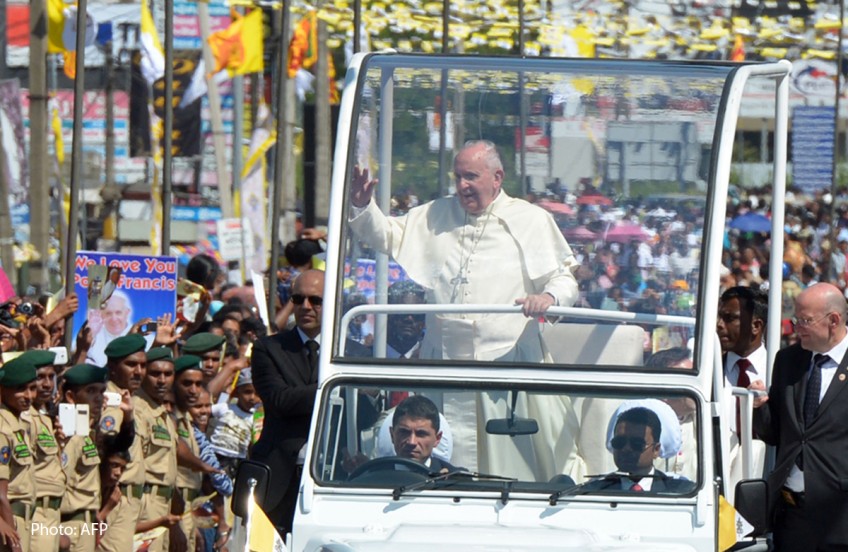Pope urges respect for human rights on Sri Lanka trip

COLOMBO - Pope Francis urged respect for human rights in Sri Lanka as he began a two-nation Asia tour on the island Tuesday, bearing a message of peace and reconciliation after a decades-long civil war.
His visit, days after the surprise election of a new president, will focus on unity in a country struggling to heal the wounds of a 37-year conflict that pitted troops against Tamil separatist rebels.
The Argentine pope's second visit to Asia will also take in the Philippines, a bastion of Christianity in the region, where he is set to attract one of the biggest-ever gatherings for a head of the Catholic Church.
But in mostly Buddhist Sri Lanka, which has seen a rise in religious violence in recent years, he will focus on the role of the Church in a diverse society.
"The great work of rebuilding must embrace improving infrastructures and meeting material needs, but also, and even more importantly, promoting human dignity, respect for human rights, and the full inclusion of each member of society," the pope said on his arrival.
Human rights are a hugely contentious issue in Sri Lanka, which has alienated the international community by refusing to cooperate with a UN-mandated investigation into alleged wartime mass killing of civilians.
'Pursuit of truth'
"The process of healing also needs to include the pursuit of truth," said the pope, who was greeted at Colombo's main airport by new President Maithripala Sirisena.
Sirisena, who took office only days ago, has promised an independent domestic inquiry into the allegations of wartime rights abuses under his predecessor Mahinda Rajapakse.
Only around six per cent of the 20-million-strong population is Catholic, but the religion is seen as a unifying force because it includes people from both the majority Sinhalese and minority Tamil ethnic groups.
Sirisena has pledged to protect religious freedoms and promised a new culture of tolerance on the island, which was devastated by the conflict that ended in May 2009.
"All members of society must work together; all must have a voice," said the pope, who was greeted by flag-waving well-wishers including a group of Muslim schoolgirls as he stepped off the plane onto the red carpet.
Traditional Sri Lankan dancers and drummers lined the red carpet, and around 50 baby elephants decorated with brightly coloured fabrics greeted his arrival.
Earlier, the pope told journalists on the plane he was praying for France following attacks by Islamist militants which left 17 people dead.
On Wednesday, which has been declared a national holiday, he will hold a mass on the Colombo seafront that is expected to attract around one million people.
He will canonise Sri Lanka's first saint, a 17th century missionary, during the open-air service.
He will also visit a small church in the jungle that was on the front lines of the ethnic conflict, which killed around 100,000 people.
The Our Lady of Madhu church in the mainly Tamil north provided sanctuary during the fighting, and is now a pilgrimage destination for Christians from across the ethnic divide.
Special interest in Asia
The pope's trip comes just five months after he visited South Korea, signalling the huge importance the Vatican places on Asia and its potential for more followers.
The region holds a special interest for Pope Francis, who as a young priest considered becoming a missionary in Japan.
On Thursday he will fly on to the Philippines, where anticipation has been building for months, with the pope dominating the media and sparking a merchandise frenzy.
The Philippines is one of the Church's modern success stories, counting roughly 80 per cent of the former Spanish colony's 100 million people as Catholics. This has helped to offset waning influence in Europe and the United States.
He will meet survivors of Super Typhoon Haiyan, which claimed 7,350 lives when it destroyed entire farming and fishing communities in 2013.
The pope will celebrate mass with tens of thousands of survivors at the airport in Tacloban, one of the worst-hit cities.
Security will be a major issue throughout the pontiff's Asia trip, although he travelled from Colombo airport in an open-top vehicle, waving to the huge crowds lining the streets to welcome him.
Pope Francis has shunned the pomp of his predecessors, and said earlier this year he prefers not to use the bulletproof "popemobile" favoured by previous pontiffs.
Francis is the first pope to visit Sri Lanka since John Paul II two decades ago.